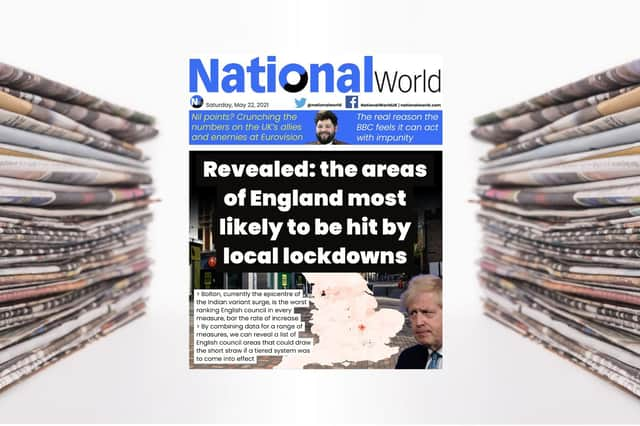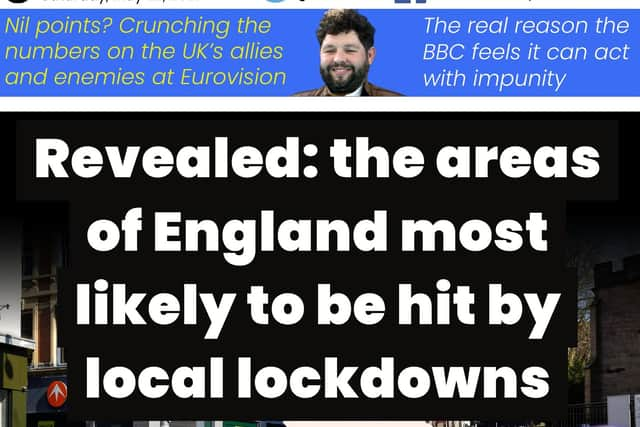These are the areas in England which are most at risk of local lockdowns - NationalWorld digital front page


As we go into the first weekend since the reopening of pubs (and presumably other things?), the potential for lockdowns might be the last thing we want to think about.
But the rising number of Indian variant infections in parts of the UK means that there is, unfortunately, a possibility that local lockdowns could return.
Advertisement
Hide AdAdvertisement
Hide AdWhich is why NationalWorld’s data and investigations editor Harriet Clugston has run the numbers to work at which areas are most at risk.


She writes: “Last year the Government revealed some of the criteria it looked at when deciding on local restrictions.
“These include the rate of Covid cases per 100,000 people, the rate of increase, the prevalence among people aged 60 and over, the positivity rate – which is the proportion of tests that come back positive – and pressure on the NHS.
“Bolton, currently the epicentre of the Indian variant surge, is the worst ranking English council in every measure bar the rate of increase.
Advertisement
Hide AdAdvertisement
Hide Ad“Its rate of increase of 99% in the week to 15 May put it in 21st place in the country. However, it was largely surpassed by councils with a high rate of increase but from a much lower base.
“The biggest increase for instance was in Bolsover, where the case rate increased by 417%, from 1.2 to 6.2 cases per 100,000 people.
“Bolton meanwhile now has a rate of 321 cases, up from 161.4 a week earlier, dwarfing the current England average of 21.”
Read on to find out the full list of areas most at risk of local lockdowns.
Friends and enemies: Who’s going to vote for us at Eurovision?
Advertisement
Hide AdAdvertisement
Hide AdFrom one hard-hitting data-driven story to another, Aimee Stanton has gone back through Eurovisions passed to work out which nations James Newman, the UK’s entry (obviously), can likely rely on for points.
Now, nobody is suggesting that the voting in the Eurovision song contest is informed by anything other than the performances on the night, perish the thought! That said, data doesn’t lie.
Our good friends in Ireland are our most reliable backers in the contest, based on an analysis of Eurovisions from 1975 to 2019.
As well as looking at who is likely to back us on Saturday night, we also know which countries we can cross off the Christmas list, based on their lack of support for us in previous years.
Advertisement
Hide AdAdvertisement
Hide AdOf all the countries to have awarded us ‘nil points’ on the night, Greece tops the leaderboard, having done so on a whopping 28 occasions.
As the Bashir scandal is exposed, Defund the BBC argue it is proof the corporation feels it can ‘act with impunity’
Writing for NationalWorld, campaign director of Defund the BBC - an organisation which campaigns to revoke the BBC’s primary method of funding - Rebecca Ryan, says part of the reason the BBC feels it can “act with impunity,” is because it isn’t at risk of being boycotted.
She writes: “Whereas any normal business operating under commercial conditions has to fear the risk of boycott or divestment in response to scandal, the compulsory nature of the licence fee means no matter how bad things get, at the end of the day, the BBC knows things will always be okay.
“Connected to this, unfortunately this non-existent link between the BBC and market conditions (ordinary viewers) also means that the BBC feels little need to reflect the desires of audiences – hence its imposition of a trigger warning on legendary sitcom Blackadder and even more absurdly the removal of the politically incorrect but popular show Little Britain from iPlayer.
Advertisement
Hide AdAdvertisement
Hide Ad“Seen through this unaccountable prism, despite criticism over these matters, it’s no surprise then that seemingly no attempt has been made to rectify this widely held perception that the BBC is biased against the views of those from more traditional, non-metropolitan areas.”
Although I’m not entirely sure what is meant by a “traditional, non-metropolitan area,” Ryan’s piece poses interesting questions about the public service broadcaster in the wake of its latest scandal.